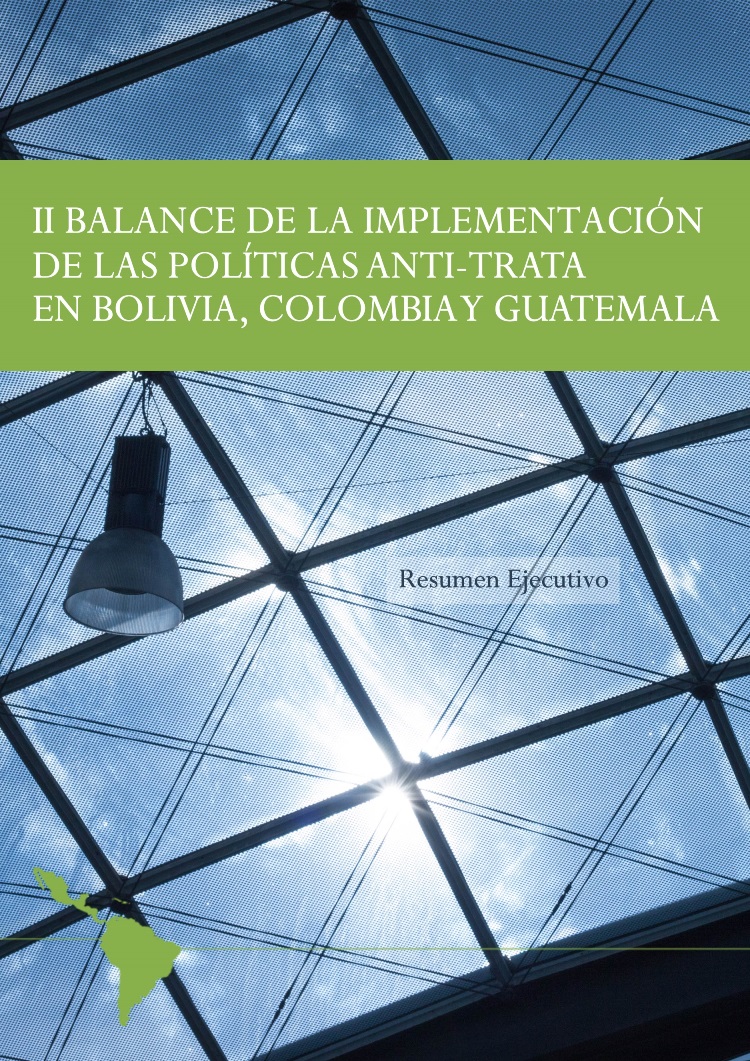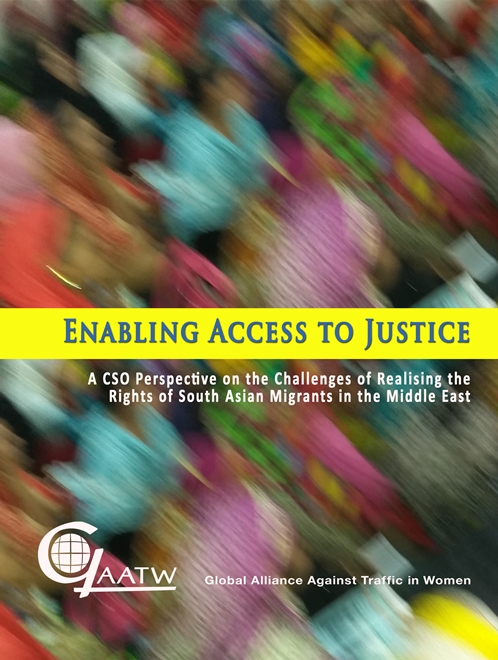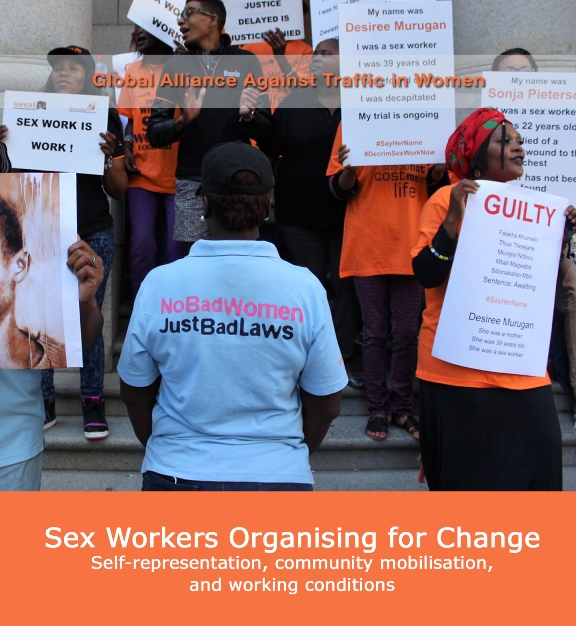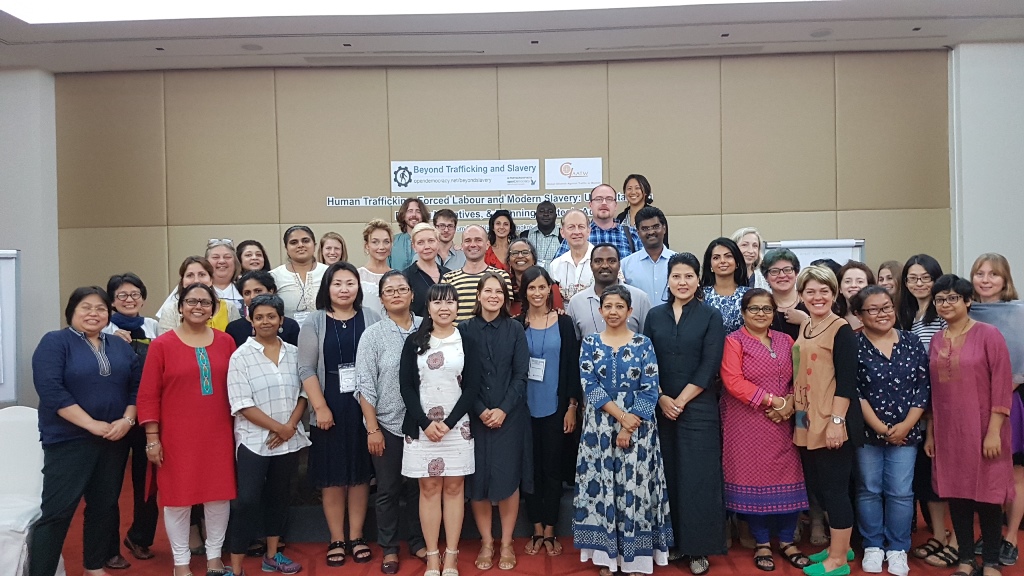E-Bulletin January 2018 - At the beginning of a new year...
Dear friends,
It’s been a whole year since we published our last English-language bulletin. We were caught in a whirlwind of projects activities, deadlines, conferences, and workshops, and we had less time for reflection and communication with our members and partners, although many exchanges around concrete issues or events did take place. Adding to that was the strained human resource situation within our team, with two colleagues leaving the organisation in January-March and two in September-October. However, we were pleased to welcome two new colleagues at the end of 2017 – Eunha Gim as Programme Officer Research and Ratna Mathai-Luke as Programme Officer Asia.
With new additions to the team and new energy at the beginning of the year, it is our wish for the new year (we won’t say resolution!) to make the time to inform you more regularly about our work. We do believe it is important to share our successes, challenges and insights with all of you, as well as learn from yours.
In 2017 we continued working on our three thematic priorities – Accountability, Access to Justice, and Power in Migration and Work - as well as our core activities of research, advocacy, and participatory learning.
 Within the Accountability programme, we worked with our members and partners in Bolivia, Colombia, and Guatemala to conduct, for the second year in a row, an assessment of their governments’ obligations to implement national anti-trafficking policies. Similarly to the 2016 Assessment, the one published in 2017 found that institutions in the three countries are not fulfilling their legal responsibilities and are failing to guarantee the rights of trafficked persons and at-risk groups. Governments do not allocate appropriate budgets, do not collect statistical information, and do not ensure ongoing training of state officials. In addition, this time government institutions were less cooperative, and in some cases hostile, to the requests for information they received from our partners. This is yet another manifestation of the shrinking space for civil society that we are witnessing throughout the world, and the diminished opportunities for NGOs to act as watchdogs. We reflected on some of these frustrations in a short piece published this month on Beyond Trafficking and Slavery. In 2018, together with our members and allies, we will continue this work and review what we’ve done so far in order to deepen the analysis and improve the methodology.
Within the Accountability programme, we worked with our members and partners in Bolivia, Colombia, and Guatemala to conduct, for the second year in a row, an assessment of their governments’ obligations to implement national anti-trafficking policies. Similarly to the 2016 Assessment, the one published in 2017 found that institutions in the three countries are not fulfilling their legal responsibilities and are failing to guarantee the rights of trafficked persons and at-risk groups. Governments do not allocate appropriate budgets, do not collect statistical information, and do not ensure ongoing training of state officials. In addition, this time government institutions were less cooperative, and in some cases hostile, to the requests for information they received from our partners. This is yet another manifestation of the shrinking space for civil society that we are witnessing throughout the world, and the diminished opportunities for NGOs to act as watchdogs. We reflected on some of these frustrations in a short piece published this month on Beyond Trafficking and Slavery. In 2018, together with our members and allies, we will continue this work and review what we’ve done so far in order to deepen the analysis and improve the methodology.
In 2017 we also began a landscape assessment exercise to map the advocacy work related to trafficking undertaken by NGOs in the ASEAN region. We conducted scoping visits to five countries to determine the interest and capacity of civil society organisations to conduct monitoring of the implementation of the ASEAN Convention against Trafficking in Persons (ACTIP), and this year we will visit another four countries. Once the study is complete, we will organise a regional consultation to determine how regional advocacy efforts on the monitoring and implementation of ACTIP may be better coordinated.
 Within the Access to Justice programme, we completed two projects and published two reports summarising their key findings and learnings. The first one, Access Unknown, highlights the experiences of abuse, labour exploitation, and human trafficking of Cambodian migrant workers in Thailand and the factors that facilitate or hinder their access to justice. It documents how lack of information about migration and work procedures and working conditions, mistrust of authorities, and lack of information about sources of support, prevent Cambodian workers from seeking justice for rights violations in Thailand. The second report, Enabling Access to Justice, focuses on the experiences of CSOs in trying to support South Asian women migrant workers abused and trafficked in the Middle East. The report documents the many obstacles to justice that migrant workers face, including legal, social, and procedural, and the many ways in which CSOs are assisting them in their struggles. Some of these are exemplified through the stories of three Nepali women, documented in a thirty-minute video. Based on the two reports, as well as reports by GAATW members in Europe and consultations with members in Asia, we prepared a submission to the UN Special Rapporteur on Contemporary Forms of Slavery for a special report on access to justice and remedies for victims of contemporary forms of slavery. It is clear from our work that justice remains an elusive concept for many trafficked persons and abused migrant workers the world over, and cannot be separated from the broader issues of democracy and rule of law. In many countries, corrupt, slow, and inefficient legal systems prevent marginalised groups, such as migrants or trafficked persons, from seeking justice. In many countries, trafficked persons don’t even associate the concept of justice with the legal system and simply want to move on with their lives and find a new, non-exploitative job, without seeking recourse for the abuses they suffered. We were pleased that these, and other issues we highlighted, were included in the Special Rapporteur’s report.
Within the Access to Justice programme, we completed two projects and published two reports summarising their key findings and learnings. The first one, Access Unknown, highlights the experiences of abuse, labour exploitation, and human trafficking of Cambodian migrant workers in Thailand and the factors that facilitate or hinder their access to justice. It documents how lack of information about migration and work procedures and working conditions, mistrust of authorities, and lack of information about sources of support, prevent Cambodian workers from seeking justice for rights violations in Thailand. The second report, Enabling Access to Justice, focuses on the experiences of CSOs in trying to support South Asian women migrant workers abused and trafficked in the Middle East. The report documents the many obstacles to justice that migrant workers face, including legal, social, and procedural, and the many ways in which CSOs are assisting them in their struggles. Some of these are exemplified through the stories of three Nepali women, documented in a thirty-minute video. Based on the two reports, as well as reports by GAATW members in Europe and consultations with members in Asia, we prepared a submission to the UN Special Rapporteur on Contemporary Forms of Slavery for a special report on access to justice and remedies for victims of contemporary forms of slavery. It is clear from our work that justice remains an elusive concept for many trafficked persons and abused migrant workers the world over, and cannot be separated from the broader issues of democracy and rule of law. In many countries, corrupt, slow, and inefficient legal systems prevent marginalised groups, such as migrants or trafficked persons, from seeking justice. In many countries, trafficked persons don’t even associate the concept of justice with the legal system and simply want to move on with their lives and find a new, non-exploitative job, without seeking recourse for the abuses they suffered. We were pleased that these, and other issues we highlighted, were included in the Special Rapporteur’s report.
Within the Power in Migration and Work programme, we continued working on the two projects in South Asia – Work in Freedom, and Towards Empowerment. We conducted a number of workshops with community workers in Bangladesh, India, and Nepal. The aim of these workshops was to provide some conceptual clarity around safe migration and human trafficking to community workers who work with women at the pre-migration and pre-decision making stage. At the same time, it was an opportunity for us to understand their insights and perspectives on key issues related to women’s labour migration, women’s work, and the role of NGOs in communities of origin. One thing that we consistently noticed was how underpaid and undervalued community workers are. While they do all the actual work of going to (often remote) communities, speaking to women and providing them with information about safe migration and work, it is usually their (male) managers who receive all the trainings, exchanges of experience, and other capacity enhancing and growth development opportunities. To remedy this, in October and November we organised site visits for mutual learning of community workers to one destination site (New Delhi, India) and to one source community (Rupandehi, Nepal). Before the end of year, we visited Lebanon and Jordan to understand the role of community workers in building communities and creating solidarity among migrant workers in a destination country. A full documentation of the learning experience based from the sharing of selected community workers and migrant support groups in countries of origin and destination will be published in the first quarter of 2018.
In addition to these two projects, we facilitated a five-day training workshop on trafficking and safe migration for thirteen Ethiopian NGOs who were involved in the Ethiopia Prevention of Unsafe Migration Program. The overall aims of this workshop were to strengthen a rights-based perspective and adequate knowledge and skills on the issues of women, work and mobility; and increase knowledge of the process of communication in learning and reflection in relation to working with women in source communities. It was also an opportunity for us to get to know service providers in Africa, where we have traditionally had only limited engagement.
While working on these three programmatic priorities in 2017, we realised that we sometimes struggle to fit our projects and activities neatly into them, and 2018 may be the time to rethink them. Without departing from our principles and methods, it seems like our work has been converging towards taking a worker-centred approach to human trafficking. After all, all women are workers, whether their work is valued and remunerated fairly or not. So, we are increasingly looking at different sectors where women work, the conditions that enable, or prevent, exploitation and trafficking in these sectors, and the strategies that civil society actors employ to support women and protect their rights. In April, together with the ILO, we will co-organise a regional forum Women in the World of Work, which will bring together women’s rights, labour rights, migrant rights organisations and trade unions to share knowledge, build synergies, and exchange ideas on improving advocacy and solidarity between women workers, migrant organisations and women’s movements. Throughout the year, we will also be working with nine partners from South and Southeast Asia and the Middle East to conduct research among women migrant workers and understand from their perspective the factors that facilitate and hinder their right to mobility and work in both countries of origin and destination.
 One initiative within this new approach in 2017 was our main research project, which looked at the sex industry in seven countries, as one sector where women work, the conditions of work there, as experienced by sex workers, and the role of sex worker rights organisations in assisting sex workers. We documented the many creative strategies that the organisations employ to protect the rights of workers who experience violence, abuse, and exploitation, some of which may legally be classified as trafficking, as well as to prevent these in the first place. With this research we hope to educate some of our members and partners in the anti-trafficking community who don’t overtly oppose sex workers’ rights, but don’t recognise the immense contribution of sex worker organisations to protecting the rights of women in the industry either. To this end, in December we wrote a short piece urging EU institutions and other stakeholders to involve sex worker rights organisations in the development of anti-trafficking policies and initiatives. Also in December, we presented the research findings at a conference on sex worker rights in Madrid, and at a workshop on sex worker rights of the Indian feminist organisation CREA and some of her allies. In 2018 we will support our research partners to organise events to promote the findings in their countries. In addition, in February, we will organise a convening of sex worker rights organisations, anti-trafficking organisations, and human rights funders to present the research report and find common ways to advance the rights of women involved in sex work. In March we will present the report at the 62nd session of CSW and other US-based activists, and later in the year, if funding allows us, also to a selected number of GAATW members and partners from the anti-trafficking field.
One initiative within this new approach in 2017 was our main research project, which looked at the sex industry in seven countries, as one sector where women work, the conditions of work there, as experienced by sex workers, and the role of sex worker rights organisations in assisting sex workers. We documented the many creative strategies that the organisations employ to protect the rights of workers who experience violence, abuse, and exploitation, some of which may legally be classified as trafficking, as well as to prevent these in the first place. With this research we hope to educate some of our members and partners in the anti-trafficking community who don’t overtly oppose sex workers’ rights, but don’t recognise the immense contribution of sex worker organisations to protecting the rights of women in the industry either. To this end, in December we wrote a short piece urging EU institutions and other stakeholders to involve sex worker rights organisations in the development of anti-trafficking policies and initiatives. Also in December, we presented the research findings at a conference on sex worker rights in Madrid, and at a workshop on sex worker rights of the Indian feminist organisation CREA and some of her allies. In 2018 we will support our research partners to organise events to promote the findings in their countries. In addition, in February, we will organise a convening of sex worker rights organisations, anti-trafficking organisations, and human rights funders to present the research report and find common ways to advance the rights of women involved in sex work. In March we will present the report at the 62nd session of CSW and other US-based activists, and later in the year, if funding allows us, also to a selected number of GAATW members and partners from the anti-trafficking field.
Our advocacy work in 2017 was mainly focused on the Global Compact for Migration. It was a busy period with six thematic consultations held in New York, Geneva, and Vienna, in advance of a stocktaking meeting which took place in December, and the intergovernmental negotiations which will commence in early 2018, after the publication of the Secretary General’s report on the Compact and the release of the zero draft of the document. We and some of our members were intensely involved in this process throughout 2017, participating in regional preparatory meetings, the thematic sessions on the human rights of migrants (May), on international cooperation and migration (June), smuggling and trafficking (September) and labour rights (October), as well as regional consultations and related meetings. We and our members delivered a range of interventions and responses to these consultations, and we prepared position papers on four thematic areas. Throughout this process, we called on states to comply with their human rights obligations to migrants which are provided for by the core human rights treaties and we pushed back against policies which seek to undermine migrants’ human rights. 2018 will be a year in which the text of the Compact will be negotiated by member states, primarily in New York. We will need to keep up all the pressure on states to support a right-based Compact and a transparent and inclusive process. Aside from this, we will continue to pursue a two pronged advocacy strategy, whose overarching objectives are to engage critically with the anti-trafficking framework, and to amplify progressive feminist analysis within migrant rights discourse and work, and seek to create opportunities at the regional and national levels to achieve these aims.
 We also organised two participatory learning initiatives. In August we organised a workshop titled ‘Human Trafficking, Forced Labour and Modern Slavery: Understanding Popular Narratives and Planning Strategic Action’, in cooperation with Beyond Trafficking and Slavery (BTS). Over the course of three days, more than 50 GAATW members and partners from all regions of the world, and our allies from the BTS team, discussed the evolution of laws and policies around human trafficking and safe migration and their impact on the lives of trafficked persons and migrants; the use of statistics, estimates, and grading/tiering of countries; the conceptual quagmire that has been created by the ‘modern slavery’ discourse and its interchangeable use with human trafficking and forced labour; and tried to unpack related concepts, such exploitation and decent work, and what they mean in different contexts. On the final day we identified together some opportunities for future actions that the GAATW Secretariat can undertake on behalf of members and partners. In November, we organised a similar workshop for the Work in Freedom partners from Nepal, India, and Bangladesh. This type of consultation is particularly important for our ongoing efforts to strengthen the Alliance, as they offer us and our members an opportunity to come together, learn from each other and plan strategic actions. Our currently limited core funding may not allow us to organise a similar global conceptual workshop this year but we will organise one for members and partners in Latin America.
We also organised two participatory learning initiatives. In August we organised a workshop titled ‘Human Trafficking, Forced Labour and Modern Slavery: Understanding Popular Narratives and Planning Strategic Action’, in cooperation with Beyond Trafficking and Slavery (BTS). Over the course of three days, more than 50 GAATW members and partners from all regions of the world, and our allies from the BTS team, discussed the evolution of laws and policies around human trafficking and safe migration and their impact on the lives of trafficked persons and migrants; the use of statistics, estimates, and grading/tiering of countries; the conceptual quagmire that has been created by the ‘modern slavery’ discourse and its interchangeable use with human trafficking and forced labour; and tried to unpack related concepts, such exploitation and decent work, and what they mean in different contexts. On the final day we identified together some opportunities for future actions that the GAATW Secretariat can undertake on behalf of members and partners. In November, we organised a similar workshop for the Work in Freedom partners from Nepal, India, and Bangladesh. This type of consultation is particularly important for our ongoing efforts to strengthen the Alliance, as they offer us and our members an opportunity to come together, learn from each other and plan strategic actions. Our currently limited core funding may not allow us to organise a similar global conceptual workshop this year but we will organise one for members and partners in Latin America.
We continued publishing the Anti-Trafficking Review, our open access, peer reviewed journal that aims to bridge the academic and practitioner worlds by publishing cutting edge research and conceptual papers related to trafficking, migration, women’s rights, and labour rights. In April, the eighth issue of the journal, themed ‘Where’s the Evidence?’ focused on the evidence that is used to inform national-level anti-trafficking policies, as well as the role of monitoring and evaluation of anti-trafficking initiatives, and of data, statistics, and estimates on human trafficking and ‘modern slavery’. In September, the ninth issue, themed ‘The Lessons of History’, explored some of the histories that created and continue to shape the phenomena discussed under the rubric of human trafficking, and the contemporary discourse of trafficking itself. Contributions to the issue revealed that a more critical engagement with history can teach us a great deal about the forms of violence, injustice, and oppression that are tolerated today. In 2018 we will publish again two issues of the journal: in April, ‘Life after Trafficking’ will look into the many challenges that trafficked persons face after leaving the situation of trafficking and the support they need to move on with their lives; and in September, ‘Irregular Migrants, Refugees of Trafficked Persons?’ will explore the different categorisations of people on the move, who applies them and why, and what their impact is on migrants’ human rights.
In the second half of the year, an organisational assessment of the Alliance was carried. We are grateful to all members and supporters who took the time to participate in the online survey and/or speak to the evaluators. The assessment report has just arrived. We will discuss it within the team and with the International Board and get back to the membership with a brief summary of the report at our earliest.
Finally, but most importantly, none of this work would’ve been possible without our supporters. We express our sincere gratitude to the many members, partners, and other civil society organisations, donors, academics, researchers, international organisations, external consultants, human rights activists and most of all, migrant and trafficked women, domestic workers, sex workers, and all other women workers, who shared their invaluable knowledge and expertise with us. Thank you for believing in us!
We wish you all happy, healthy, and prosperous 2018!
GAATW-IS team: Alfie, Bandana, Bobby, Chus, Eunha, Leah, Nong, and Ratna.

